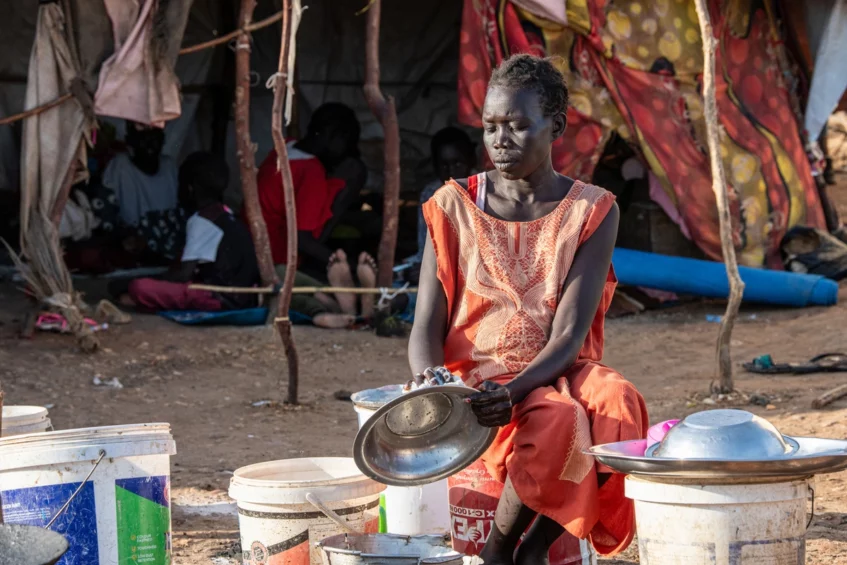You are here: Home | Health | Humanitarian | News | MSF sounds alarm as overcrowding hits Renk, Bulukat transit centers

Umjuma Achol Mut washes dishes outside her makeshift shelter at the transit centre. (Photo: UNHCR/Samuel Otieno)
Medical charity Doctors Without Borders (MSF) warned on Thursday of a deteriorating humanitarian crisis in Bulukat and Renk transit centers for refugees and returnees crossing through Upper Nile state.
MSF said thousands of people who fled the conflict in Sudan are craving for essential needs including clean water, food, shelter and healthcare.
It stated that overcrowded and unhygienic living conditions in the transit sites further increase the risk of disease outbreaks, warns MSF.
“We are deeply concerned about the situation at the transit sites at a time when more people are expected to arrive due to intensified fighting in Sudan,” said Zakaria Mwatia, MSF head of mission in South Sudan, in a press statement.
“Given the growing impact of the Sudan crisis on people’s humanitarian needs in South Sudan, there is a pressing need to expand the delivery of aid. MSF urges international organizations and the authorities to strengthen humanitarian assistance to alleviate the suffering of those people affected by the crisis.”
More than 500,000 people have crossed to South Sudan since the war erupted in Khartoum on April 15, 2024, aid agencies say, adding that 80 per cent are South Sudanese returning to their country of origin.
Mr. Mwatia said many of the displaced civilians have no clear destination and spend weeks or months in and around the transit centers, struggling to survive with a scarcity of humanitarian aid.
Renk County at the border with Sudan has two transit sites, both of which are “dangerously” overcrowded with almost 30,000 people living in an area meant to host no more than 12,000 people, MSF said.
It added that the transit site at Bulukat is smaller but has consistently hosted around 5,000 people at any given time in harsh living condition since last July.
“Many families fled their homes with few or no belongings, and are now vulnerable to hunger, malnutrition and disease, exacerbated by inadequate shelter and the lack of clean water and sanitation facilities,” the organization said.
MSF stated that its teams have been running two mobile clinics treating around 150 patients every day in Renk since May and one in Bulukat since July to provide basic healthcare to returnees, refugees and host communities.
MSF teams are also supporting the paediatric ward and inpatient treatment facility for malnourished children in Renk Civil Hospital.
In 2023, MSF said it responded to measles outbreaks, treated alarming numbers of malnourished children and responded to a rise in malaria cases among people staying in the transit sites.
The international medical organization said its teams are on alert to respond to outbreaks of measles and waterborne diseases in the coming months and have set up two isolation wards for measles and cholera in Renk.
“The current gaps in water, sanitation and hygiene are posing a severe threat to public health,” says Mwatia, according to the statement.
“Better hygiene and sanitation measures and vaccination campaigns – at the point of entry into South Sudan, as well as in Renk and Bulukat transit sites – must be reinforced to prevent possible outbreaks of disease. Simultaneously, rapid onwards transportation of people is imperative to prevent prolonged stays at the transit centres.”
Support Eye Radio, the first independent radio broadcaster of news, information & entertainment in South Sudan.
Make a monthly or a one off contribution.
Copyright 2024. All rights reserved. Eye Radio is a product of Eye Media Limited.